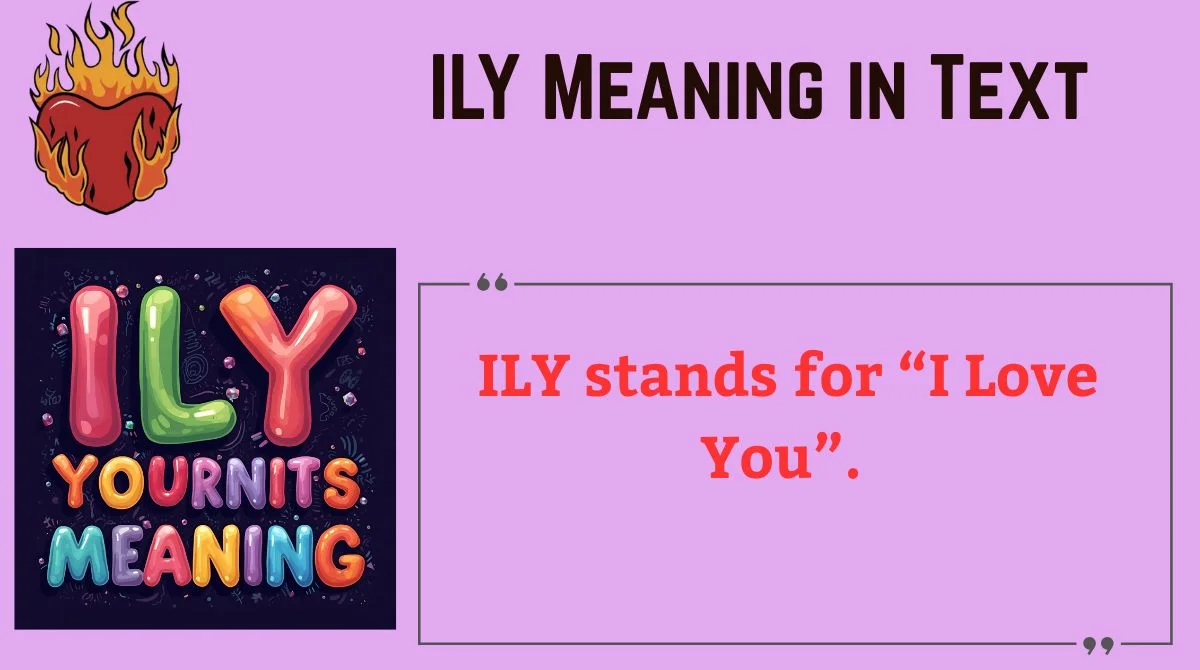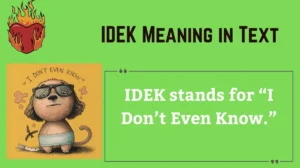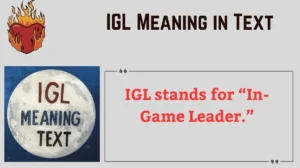Texting has changed the way we express emotions. Acronyms like ILY have become common shortcuts for saying something deeply personal without typing out the full words.
But what does ILY really mean in text, and when is it appropriate to use it? In this guide, we’ll break it all down, giving you a comprehensive look at the meaning, history, usage, and even cultural nuances of ILY.
Definition & Meaning of ILY
ILY stands for “I Love You”. It’s one of the most widely used text abbreviations in digital communication.
- Primary Meaning: A direct expression of love or affection.
- Casual Use: Friends often use it as a playful or affectionate gesture.
- Tone Matters: The emotional weight of ILY can vary depending on the relationship and context.
“Texting ‘ILY’ is like sending a virtual hug—it’s short but can carry a lot of emotion.”
Key Takeaway: ILY is versatile but always context-dependent.
Background & History
The acronym ILY emerged in the early 1990s with the rise of SMS texting and AOL chat rooms. Typing out “I Love You” took too many characters, so people started abbreviating.
- 1990s: Early chatrooms and text messages popularized ILY.
- 2000s: Social media platforms like Facebook and MySpace spread its usage.
- 2010s: Mobile messaging apps (WhatsApp, iMessage) made it ubiquitous.
Fun Fact: ILY is among the top 20 text abbreviations globally used for expressing affection.
Usage in Various Contexts
ILY isn’t just for romantic relationships. Its meaning changes depending on the context.
Romantic
- Expresses love or attraction.
- Often paired with emojis like ❤️, 😘, or 🥰.
Platonic
- Used among close friends as a sign of affection.
- Examples: “ILY bro!” or “ILY bestie!”
Family
- Kids and parents often use it to convey love quickly.
- Example: Texting a parent “ILY mom ❤️” after school.
Casual
- Sometimes used jokingly, especially among teens.
- Could mean “I like you” in a humorous or exaggerated way.
Common Misconceptions & Clarifications
Many people misinterpret ILY. Let’s clear some myths:
| Misconception | Reality |
|---|---|
| ILY always means romantic love | Not always—friends and family use it too |
| Using ILY casually is disrespectful | Casual use is widely accepted in modern texting |
| Saying ILY first is risky | Depends on context; in friendship, it’s normal |
Clarification: Tone, relationship, and context matter more than the acronym itself.
Similar Terms & Alternatives
There are other abbreviations and ways to express love:
- ILU: I Love You (alternative spelling)
- LY: Love You (shorter, less formal)
- LYLAS: Love You Like A Sister
- Emoji Equivalents: ❤️, 😘, 💖
Tip: Choosing between ILY, ILU, or LY depends on formality and emotional intensity.
How to Respond to ILY
Responding to ILY can feel tricky if you’re unsure of the intent. Here are some examples:
- Romantic Response: “ILY too ❤️” or “I love you more 😘”
- Friend Response: “ILY bro!” or “Same, bestie 😂”
- Neutral/Polite Response: “Thanks! That means a lot”
Pro Tip: Match the tone of the sender to avoid miscommunication.
Regional or Cultural Differences
ILY can mean slightly different things depending on the region:
- USA & UK: Romantic and platonic use is common.
- Asia: Younger generations adopt ILY frequently; older generations prefer full expressions.
- Middle East: ILY among family is less common in public messaging due to cultural norms.
Age Factor: Teens are more likely to text ILY casually, while adults reserve it for serious messages.
Comparison with Similar Terms
Here’s how ILY stacks up against related terms:
| Term | Emotional Weight | Typical Use | Example |
|---|---|---|---|
| ILY | High | Romantic & Platonic | “ILY ❤️” |
| ILU | Medium | Casual | “ILU bro” |
| LY | Low | Friendly | “LY 😄” |
| XOXO | Medium | Affectionate | “XOXO hugs” |
Insight: ILY is the most versatile, carrying both serious and playful tones depending on context.
Usage in Online Communities & Dating Apps
Online platforms have transformed ILY usage:
- Dating Apps: ILY is often used after building rapport; sending it too early can be seen as rushed.
- Social Media: Tweets, Instagram comments, and memes often feature ILY casually.
- Online Communities: Gaming, forums, and fan groups use ILY as friendly shorthand.
Example: On Discord, “ILY for carrying me in that match 😂” shows platonic affection rather than romantic intent.
Hidden or Offensive Meanings
While rare, some misunderstandings can occur:
- Overuse: Repeatedly texting ILY can feel insincere.
- Misinterpretation: Someone may see it as romantic when it’s meant platonically.
- Sarcasm: ILY in sarcastic messages can be taken offensively.
Always read context before replying. Emojis often help clarify tone.
Suitability for Professional Communication
ILY is usually not recommended in professional settings.
- Why: Can seem unprofessional or overly familiar.
- Alternatives: Use “Thank you,” “Appreciate you,” or “Best regards.”
- Example Table:
| Scenario | Appropriate | Inappropriate |
|---|---|---|
| Team chat | “Thanks for your help!” | “ILY for helping 😅” |
| “Appreciate your support” | “ILY ❤️” |
Tip: Stick to professional language to avoid awkwardness.
FAQs About ILY Meaning in Text
Is it okay to say ILY first?
Yes, especially among friends. In romantic contexts, gauge the relationship first.
Can ILY be used casually with friends?
Absolutely! Many teens and young adults use it as a playful expression.
How to know if someone really means it?
Look for context, consistency, and tone, not just the acronym.
Are there cultural differences in interpretation?
Yes. Age, country, and social norms influence how ILY is received.
Can ILY be misunderstood?
Yes, especially without emojis or additional context. Tone matters.
Conclusion
The acronym ILY is much more than a simple text shortcut. It conveys affection, warmth, and sometimes humor, depending on the context.
Understanding ILY meaning in text helps you communicate more effectively with friends, family, and even romantic interests. Always consider tone, relationship, and cultural norms before sending or responding.
In a digital world where messages fly fast, ILY remains a concise, emotional, and universally recognized way to say “I love you.”

Mark Peter is the creative mind behind RizzleLineLove.com, your go-to hub for witty, flirty, and downright hilarious pick-up lines. With a passion for blending humor and charm, Mark crafts content that sparks conversations, breaks the ice, and adds a playful twist to everyday moments.
Whether you’re looking to impress your crush, make your friends laugh, or spice up your social media captions, his work is all about helping you connect — one clever line at a time.



